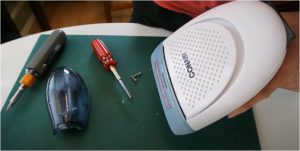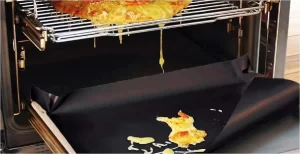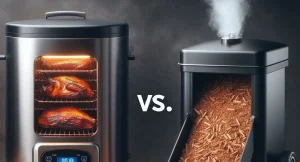Smoking on a Charcoal Grill: Tips to Reduce Excess Smoke
Experiencing excessive smoke from your charcoal grill can be frustrating and impact the overall grilling experience. When your charcoal grill is smoking too much, identify the potential causes and address them accordingly.
One possible reason for excessive smoke is the improper amount of charcoal used. Ensure you’re using the right quantity of charcoal to maintain a balanced heat level. Another factor to consider is the ventilation of your grill. Insufficient airflow can lead to excessive smoke. Check for any obstructions or blockages in the vents or chimney that may hinder the smoke from escaping.
The type and quality of charcoal can play a role in smoke production. Using damp or unseasoned charcoal can result in more smoke. Make sure to use dry, well-seasoned charcoal for optimal grilling performance.
Another aspect to examine is the use of lighter fluid. Excessive or improper application of lighter fluid can cause thick smoke. Try to minimize the use of lighter fluid and opt for alternative methods to light your charcoal, such as using a chimney starter.
It’s worth noting that some amount of smoke is normal during the initial stages of firing up your charcoal grill. If the smoke continues excessively throughout the grilling process, it’s important to troubleshoot and address the underlying issues.
By adjusting the charcoal quantity, ensuring proper ventilation, using high-quality charcoal, and being mindful of lighter fluid usage, you can reduce excessive smoke and achieve a more enjoyable grilling experience with delicious, flavorful results.
Charcoal Grill Smoking Too Much: Causes and Solutions
Excess Smoke Production Causes
1. Inadequate Airflow
Charcoal grills require proper airflow for efficient combustion. Insufficient airflow can lead to incomplete combustion, resulting in excessive smoke. To address this issue, ensure that the grill’s vents are open and free of debris.
2. Damp Charcoal
Using damp charcoal can cause excessive smoke production. Moisture in the charcoal prevents it from burning efficiently, leading to smoldering and increased smoke. To prevent this, store charcoal in a dry, cool place and avoid using wet or damp charcoal.
3. Grease Buildup
Accumulated grease and food residue on the grill grates can cause excessive smoke. As the grease heats up, it produces smoke, which can affect the flavor of the food. Regularly cleaning the grill grates can help minimize smoke production.
Solutions for Excessive Smoke
1. Proper Ventilation
Ensure that the grill’s vents are open and unobstructed to allow for adequate airflow. Adjusting the vents can help control the temperature and smoke levels inside the grill.
2. Dry Charcoal
Always use dry charcoal for grilling. If the charcoal is damp, spread it out in a well-ventilated area to dry before using it. This will help reduce smoke production and improve combustion efficiency.
3. Clean Grill Grates
Regularly clean the grill grates to remove grease and food residue. This can be done using a grill brush or scraper. Cleaning the grates not only reduces smoke production but also helps prevent flare-ups and ensures even cooking.
4. Preheating the Grill
Preheat the grill for at least 10-15 minutes before cooking. This allows the charcoal to reach the optimal temperature for efficient combustion, reducing the likelihood of excessive smoke.
5. Quality Charcoal
Choose high-quality charcoal for grilling. Low-quality charcoal may contain impurities that can cause excessive smoke and negatively impact the flavor of the food. Look for natural lump charcoal or briquettes made from hardwood for the best results.
6. Minimize Grease Dripping
Trim excess fat from meat before grilling to reduce the amount of grease that drips onto the charcoal. This can help minimize smoke production and prevent flare-ups.
7. Two-Zone Cooking
Set up a two-zone cooking system by placing the charcoal on one side of the grill and leaving the other side empty. This allows for indirect cooking, reducing the chances of grease dripping onto the charcoal and producing excessive smoke.

Learn More: Do Blackstone Grills Rust?
The Benefits of Controlling Charcoal Smoke
1. Improved Air Quality: Controlling charcoal smoke can help reduce the amount of pollutants that are released into the air, resulting in improved air quality.
2. Reduced Health Risks: Controlling charcoal smoke can reduce the risk of health problems related to exposure to smoke, such as respiratory illnesses, asthma, and other problems.
3. Reduced Fire Hazards: Controlling charcoal smoke can reduce the risk of fire hazards due to uncontrolled smoke.
4. Reduced Exposure to Toxic Substances: Controlling charcoal smoke can reduce the amount of toxic substances that are released into the air, such as arsenic, benzene, and formaldehyde.
5. Enhanced Flavor: Controlling charcoal smoke can enhance the flavor of food that is cooked over the fire.
6. Cost Savings: Controlling charcoal smoke can help save on fuel costs due to less smoke being produced. Controlling charcoal smoke can help to protect the environment and the health of those in the vicinity.
Read Also: Is It Safe to Use a Smoker Grill on a Covered Patio?
FAQs
Can you smoke on a charcoal grill?
Yes, you can smoke on a charcoal grill. To do so, set up a two-zone cooking system by placing the charcoal on one side of the grill and leaving the other side empty. Place the food on the empty side for indirect cooking, and add wood chips or chunks to the charcoal for added smoky flavor.
Do charcoal grills produce a lot of smoke?
Charcoal grills can produce a significant amount of smoke, especially if there is inadequate airflow, damp charcoal, or grease buildup. By following proper grilling techniques and maintenance, you can minimize smoke production.
What can be done to reduce smoke on a charcoal grill?
To reduce smoke on a charcoal grill, ensure proper ventilation by keeping vents open and unobstructed, use dry and high-quality charcoal, clean grill grates regularly, preheat the grill, trim excess fat from meat, and set up a two-zone cooking system for indirect cooking.
Is charcoal grilling bad for your health?
Charcoal grilling can produce harmful compounds, such as polycyclic aromatic hydrocarbons (PAHs) and heterocyclic amines (HCAs), which are associated with an increased risk of cancer. However, by using proper grilling techniques, such as marinating meat, cooking at lower temperatures, and avoiding charring, you can minimize the formation of these compounds and reduce health risks.
Why are there dangers associated with charcoal grilling?
The dangers of charcoal grilling stem from the production of harmful compounds, such as PAHs and HCAs, as well as the risk of carbon monoxide poisoning if grilled in an enclosed space. To minimize these risks, follow proper grilling techniques, ensure adequate ventilation, and never grill indoors or in an enclosed area.
Are charcoal grills bad for the environment?
Charcoal grills can have a negative environmental impact due to the production of greenhouse gases and the depletion of natural resources, such as hardwood trees used for charcoal. To minimize the environmental impact, consider using sustainably sourced charcoal or switching to alternative grilling methods, such as electric or gas grills.
How does smoking on a charcoal grill affect the flavor of food?
Smoking on a charcoal grill imparts a distinct smoky flavor to the food, which many people find appealing. The type of charcoal and wood chips or chunks used can influence the flavor profile, allowing for a variety of taste experiences. Experiment with different combinations to find the perfect smoky flavor for your grilled dishes.
Conclusion
It is clear that charcoal grilling can quickly become an unenjoyable experience if too much smoke is produced. To ensure the best grilling experience, it is important to take the necessary steps to prevent too much smoke from occurring. This includes properly preparing the charcoal and ventilation, as well as monitoring the temperature and adding wood chips for additional flavor. By following these steps, you can enjoy the delicious flavors of charcoal grilling without any of the smoke.
Read More: Smoking With Charcoal Pellets: The Ultimate Guide





